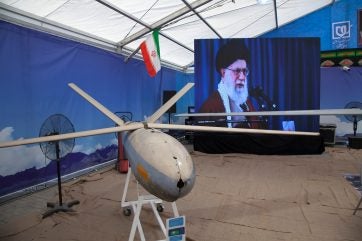Harry McNeil

At the Iranian Military Museum, an Israeli drone used for espionage purposes is exhibited with a monitor displaying Ali Khamenei in the background. Source: saeediex/Shutterstock
The US Department of the Treasury’s Office of Foreign Assets Control has revealed a series of sanctions against a network of suppliers facilitating Iran’s development of ballistic missiles and Unmanned Aerial Vehicles (UAVs).
Leading Guide to Military UAV Suppliers for the Air Defense Industry
The document includes detailed information on the manufacturers and suppliers and their products, along with contact details, to inform your purchasing decision.Download free guide
The move aims to disrupt illicit procurement channels and hold accountable those involved in exporting weapons to terrorist proxy groups.
In a decisive move aimed at curbing Iran’s military ambitions, the US Treasury has imposed sanctions on a prominent procurement network facilitating the development of Iran’s ballistic missile and UAV programmes. The targeted entities, spanning Iran and Hong Kong, have been identified as covert procurement fronts for individuals actively supporting Iran’s military organisations, including the Islamic Revolutionary Guard Corps (IRGC).
Iran is currently supplying Russia with weapons, including loitering munitions, which are being used in Ukraine. The US, the UK, and the EU have all sanctioned either Iran or firms linked to the weapons supplied by Iran, marking a new conflict point in Iranian/US relations, as per GlobalData’s US defence market intelligence.
In 2023, the US escalated efforts to disrupt Iran’s UAV programmes, targeting a multinational network across four countries involved in facilitating Iran’s UAV development. These actions came amidst concerns about Iran’s support for Russia’s actions in Ukraine.
Under Secretary of the Treasury for Terrorism and Financial Intelligence, Brian E. Nelson emphasised the gravity of Iran’s proliferation of advanced weaponry, “Iran’s continued proliferation of its advanced conventional weapons, including the UAVs and missiles that target US soldiers, remains a critical threat to the stability of the region.
We will not hesitate to leverage our full suite of tools to disrupt the illicit procurement networks that supply the components for these weapons systems, as well as hold accountable those who seek to export these weapons to terrorist proxy groups.”
In November 2023, the US responded to attacks on its personnel in Iraq and Syria by conducting a strike on an Iranian-linked weapons storage facility in Eastern Syria, using two F-15 Strike Eagle fighters.
The designated entities, including Hong Kong-based front companies FY International Trading Co., Limited, Duling Technology HK Limited, and Advantage Trading Co., Limited, have been implicated in facilitating the procurement of sensitive technology and materials crucial for Iran’s missile and UAV programmes. Additionally, Narin Sepehr Mobin Istatis, an Iran-based subsidiary of one of the sanctioned entities, has been targeted for its complicity in supporting Iran’s military objectives.
Of particular concern is the role played by Hong Kong-based front company China Oil and Petroleum Company Limited, which is implicated in arranging contracts and selling Iranian commodities worth hundreds of millions of dollars for the benefit of the IRGC-QF. The sanctions serve as a warning from the US to entities engaging in transactions with designated individuals or organisations, with stringent penalties for violators.
Extensive battlefield experience gained from conflicts in Ukraine and the Middle East, coupled with a surge in loitering munitions sales, is projected to propel the global military UAV market to nearly $18bn by 2033, according to a report by GlobalData.
The US is showing resolve to counter Iran’s destabilising activities and to prevent the proliferation of advanced weaponry to rogue actors and terrorist groups. By targeting the financial networks enabling Iran’s military expansion, the US aims to disrupt the flow of resources fuelling Tehran’s aggressive agenda while signalling its commitment to regional security and stability.
No comments:
Post a Comment